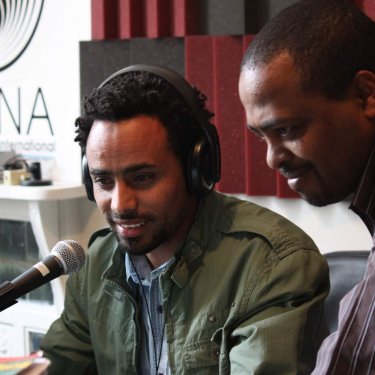10-year-old Radio Erena still the only source of independent news for Eritreans

Despite the pacification of its relations with neighboring Ethiopia, Eritrea is keeping a tight grip on news production. Ten years after its creation in Paris, Radio Erena, supported by Reporters Without Borders (RSF), remains the only voice that allows Eritreans to access independent information.
"Our Eritrean listeners went quickly from hope to disappointment,” says Amanuel Ghimai Bhata, one of Radio Erena’s three exile journalists in Paris, referring to the hopes raised by the end of several decades of almost uninterrupted conflict between Eritrea and neighbouring Ethiopia in 2018.
In Ethiopia, the end of the war was accompanied by the release of all imprisoned journalists, permission for hundreds of banned media outlets to resume working, and much more outspoken reporting. But in Eritrea, President Issaias Afeworki’s regime has carried out no such reforms.
Eritrea continues to be sub-Saharan Africa’s biggest jailer of media personnel with – according to RSF’s tally – at least 11 journalists detained in appalling conditions, without access to their families or lawyers. Some have been held for nearly 20 years.
Eritrea has no independent media and the handful of media outlets that exist have no alternative but to relay government propaganda. It is even hard to find credible news reports online. The Internet penetration rate is one of the lowest in the world and Eritreans are closely watched. In Internet cafés, they have to show ID before being allowed to go online.
“Radio Erena, which is celebrating its 10th anniversary, is the last oasis of independently produced and apolitical news reporting in the media desert that is Eritrea,” said Arnaud Froger, the head of RSF’s Africa desk. “Unfortunately, the winds of freedom blowing through the Ethiopian media for the past year stop at the Eritrean border. We continue to request proof that the journalists arrested in Eritrea are still alive, and we continue to demand their release.”
By fleeing to Europe, Radio Erena director Biniam Simon escaped the fate of many of his fellow journalists in Eritrea. A former star anchor on state-owned Eri-TV, he arrived in France in 2006 and helped to found Radio Erena three years later.
From a two-room studio in the 13th arrondissement of Paris lent by the city hall, Radio Erena manages to broadcast two hours of programming a day in Tigrinya and Arabic, Eritrea’s two main languages. According to a survey by Deutsche Welle Akademie, at least 520,000 people in Eritrea listen to it regularly.
The three Eritrean exile journalists running Radio Erena have around 20 correspondents and a network of local sources who provide them with news stories that the government does not want covered. When Muammar Gaddafi’s regime was collapsing in Libya in 2011, Radio Erena broadcast a list of refugees, most of them Eritreans, who were in Libya at the time – a time when security conditions were very bad.
“The telephone didn’t stop ringing, with the families of the migrants calling non-stop from Eritrea,” Simon recalls. “We carried on broadcasting live all day.” Two years later, when there was a coup attempt in Eritrea that dragged on for several hours, until the soldiers responsible were finally arrested, only Radio Erena managed to cover a day in which Eritrea’s fate hung in the balance.
“We must keep hoping, because the regime is very isolated and will end up falling,” Simon says. Bhata agrees: “One day, we will set up Radio Erena at home, in Asmara.” Meanwhile, you have to look almost at the very bottom of RSF’s 2019 World Press Freedom Index to find Eritrea. It is ranked 178th out of 180 countries.



